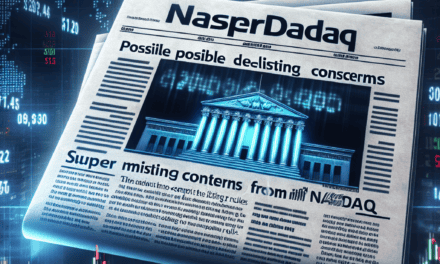“Vertiv’s Shares Tumble: Strong Q3 and Upgraded Forecast Fail to Sway Investors”
Introduction
Vertiv Holdings Co, a global provider of critical digital infrastructure and continuity solutions, recently experienced a surprising dip in its share value despite reporting an upgraded sales forecast and robust third-quarter financial results. The company’s Q3 performance showcased significant revenue growth and improved profit margins, driven by increased demand for its data center and telecommunications infrastructure products. However, the market’s reaction was unexpectedly negative, as investors appeared concerned about broader economic uncertainties and potential supply chain disruptions that could impact future performance. This paradoxical market response highlights the complex dynamics at play in the financial markets, where strong corporate earnings do not always translate into immediate investor confidence.
Analysis Of Vertiv’s Q3 Financial Performance
Vertiv Holdings Co., a global provider of critical digital infrastructure and continuity solutions, recently experienced a surprising dip in its stock value, despite reporting robust third-quarter results and an optimistic sales forecast. This unexpected market reaction has prompted analysts and investors to delve deeper into the company’s financial performance and future prospects. To understand the dynamics at play, it is essential to examine the factors contributing to Vertiv’s recent financial outcomes and the market’s response.
In its third-quarter earnings report, Vertiv announced a significant increase in revenue, surpassing analysts’ expectations. The company reported a year-over-year revenue growth of 20%, driven by strong demand for its data center solutions and services. This growth was further bolstered by the company’s strategic initiatives to expand its product offerings and enhance its global footprint. Additionally, Vertiv’s operating income saw a substantial rise, reflecting improved operational efficiencies and cost management strategies. These positive financial indicators underscore the company’s ability to capitalize on the growing demand for digital infrastructure solutions, particularly as businesses continue to invest in data center expansions and upgrades.
Moreover, Vertiv’s management provided an upgraded sales forecast for the upcoming quarters, projecting continued revenue growth and profitability. This optimistic outlook is supported by the company’s robust order backlog and a healthy pipeline of projects. The management’s confidence in sustaining this growth trajectory is further reinforced by ongoing investments in research and development, aimed at driving innovation and maintaining a competitive edge in the rapidly evolving technology landscape.
Despite these encouraging financial results and forecasts, Vertiv’s shares experienced a decline, raising questions about the underlying factors influencing investor sentiment. One possible explanation for this market reaction could be the broader economic uncertainties and volatility affecting the technology sector. Investors may be exercising caution due to concerns about potential supply chain disruptions, inflationary pressures, and geopolitical tensions, which could impact Vertiv’s operations and profitability in the future.
Furthermore, some analysts suggest that the market may have already priced in the positive earnings results, leading to a “sell the news” scenario. In such cases, investors might have anticipated the strong performance and acted on it prior to the earnings announcement, resulting in profit-taking once the news was officially released. This phenomenon is not uncommon in the stock market, particularly when a company’s performance aligns with or slightly exceeds expectations.
Additionally, it is important to consider the competitive landscape in which Vertiv operates. The digital infrastructure industry is characterized by rapid technological advancements and intense competition, with numerous players vying for market share. Investors may be scrutinizing Vertiv’s ability to maintain its growth momentum amidst these challenges, particularly as new entrants and existing competitors continue to innovate and expand their offerings.
In conclusion, while Vertiv’s third-quarter financial performance and upgraded sales forecast paint a promising picture of the company’s future prospects, the decline in its share price highlights the complexities of market dynamics and investor sentiment. As Vertiv navigates the challenges and opportunities within the digital infrastructure sector, its ability to adapt to changing market conditions and sustain its growth trajectory will be crucial in shaping its long-term success. Investors and analysts will undoubtedly continue to monitor the company’s performance closely, assessing its strategic initiatives and market positioning in the context of broader economic and industry trends.
Market Reaction To Vertiv’s Upgraded Sales Forecast
Vertiv Holdings Co, a global provider of critical digital infrastructure and continuity solutions, recently experienced a surprising dip in its stock value despite announcing an upgraded sales forecast and reporting robust third-quarter results. This unexpected market reaction has left investors and analysts pondering the underlying factors contributing to the decline in share price. To understand this phenomenon, it is essential to delve into the details of Vertiv’s financial performance, the broader market context, and investor sentiment.
In its latest earnings report, Vertiv revealed a commendable performance for the third quarter, surpassing analysts’ expectations. The company reported a significant increase in revenue, driven by strong demand for its products and services across various sectors, including data centers, communication networks, and commercial and industrial facilities. Furthermore, Vertiv’s management expressed confidence in the company’s future prospects by upgrading its sales forecast for the upcoming quarters. This optimistic outlook was based on anticipated continued growth in the digital infrastructure market, fueled by the ongoing digital transformation and increased reliance on cloud computing and data storage solutions.
Despite these positive indicators, Vertiv’s shares experienced a decline, which may seem counterintuitive at first glance. However, several factors could explain this market reaction. Firstly, it is important to consider the broader economic environment. The global economy has been facing uncertainties, including inflationary pressures, supply chain disruptions, and geopolitical tensions. These factors have contributed to a volatile market environment, where investors are increasingly cautious and risk-averse. Consequently, even companies with strong financial performance, like Vertiv, may not be immune to broader market trends.
Moreover, investor expectations play a crucial role in determining stock price movements. While Vertiv’s upgraded sales forecast and strong quarterly results were undoubtedly positive, they may not have been sufficient to exceed the high expectations already priced into the stock. In the current market climate, investors are often looking for companies to not only meet but significantly surpass expectations to justify further stock price appreciation. Therefore, the market’s reaction could be a reflection of a perceived lack of additional upside potential, rather than a negative assessment of Vertiv’s performance.
Additionally, it is worth considering the competitive landscape in which Vertiv operates. The digital infrastructure sector is highly competitive, with numerous players vying for market share. Investors may be concerned about Vertiv’s ability to maintain its growth trajectory amidst intensifying competition. This apprehension could contribute to a more cautious approach towards the company’s stock, despite its recent achievements.
Furthermore, the market’s focus on short-term results can sometimes overshadow long-term potential. While Vertiv’s quarterly performance was strong, investors may be more concerned about the sustainability of this growth in the face of potential challenges. These challenges could include technological advancements, regulatory changes, or shifts in customer preferences, all of which could impact Vertiv’s future performance.
In conclusion, the decline in Vertiv’s share price, despite its upgraded sales forecast and strong third-quarter results, can be attributed to a combination of broader market conditions, investor expectations, competitive pressures, and concerns about long-term sustainability. While the company’s financial performance remains robust, the market’s reaction underscores the complex interplay of factors that influence stock prices. As Vertiv continues to navigate this dynamic landscape, it will be crucial for the company to effectively communicate its strategic vision and address any potential challenges to regain investor confidence and drive future growth.
Factors Contributing To Vertiv’s Share Price Decline
Vertiv Holdings Co., a global provider of critical digital infrastructure and continuity solutions, recently experienced a decline in its share price despite reporting robust third-quarter results and upgrading its sales forecast. This paradoxical market reaction can be attributed to several interrelated factors that have influenced investor sentiment and market dynamics. Understanding these factors provides insight into the complexities of stock market behavior and the challenges companies face in maintaining investor confidence.
To begin with, Vertiv’s strong third-quarter performance, characterized by increased revenue and improved profit margins, initially seemed to position the company favorably in the eyes of investors. The company reported a significant year-over-year increase in sales, driven by heightened demand for its data center solutions and services. Furthermore, Vertiv’s management raised its full-year sales forecast, signaling confidence in sustained growth and operational efficiency. However, despite these positive indicators, the market’s reaction was unexpectedly negative, leading to a decline in the company’s share price.
One of the primary factors contributing to this decline is the broader economic environment, which has been marked by volatility and uncertainty. Investors are increasingly cautious due to concerns about inflation, interest rate hikes, and potential economic slowdowns. These macroeconomic factors can overshadow individual company performance, as investors may prioritize risk aversion over potential gains. Consequently, even companies like Vertiv, which demonstrate strong financial health, can experience share price declines if broader market sentiment is pessimistic.
Moreover, the technology sector, in which Vertiv operates, has been subject to heightened scrutiny and fluctuating investor confidence. The sector’s rapid growth during the pandemic has led to high valuations, prompting concerns about sustainability and potential corrections. As a result, investors may be more sensitive to any perceived risks or uncertainties, even if a company’s fundamentals remain strong. In Vertiv’s case, despite its positive earnings report, investors may be wary of the sector’s overall volatility, leading to a more cautious approach to investing in technology stocks.
Additionally, market expectations play a crucial role in influencing share prices. When a company reports earnings, investors compare the results to their expectations and those of analysts. If the results, despite being strong, do not exceed these expectations by a significant margin, the market may react unfavorably. In Vertiv’s situation, while the company delivered solid results, it is possible that investors had anticipated even higher performance or more aggressive growth projections, leading to disappointment and a subsequent sell-off.
Furthermore, profit-taking behavior among investors can also contribute to share price declines. After a period of strong performance, some investors may choose to lock in gains by selling their shares, particularly if they perceive limited upside potential in the near term. This selling pressure can lead to a temporary decline in share price, even if the company’s long-term prospects remain positive.
In conclusion, Vertiv’s share price decline, despite its upgraded sales forecast and strong third-quarter results, underscores the complex interplay of factors that influence investor behavior and market dynamics. Broader economic conditions, sector-specific concerns, market expectations, and profit-taking behavior all contribute to shaping investor sentiment. As such, companies must navigate these challenges carefully to maintain investor confidence and achieve sustainable growth in an ever-evolving market landscape.
Investor Sentiment And Vertiv’s Future Prospects

Vertiv Holdings Co., a global provider of critical digital infrastructure and continuity solutions, recently experienced a surprising dip in its share price despite reporting robust third-quarter results and upgrading its sales forecast. This unexpected market reaction has left investors and analysts pondering the underlying factors influencing investor sentiment and the company’s future prospects. To understand this phenomenon, it is essential to delve into the details of Vertiv’s financial performance, market conditions, and broader economic factors.
In its third-quarter earnings report, Vertiv announced impressive financial results, showcasing a significant increase in both revenue and profit margins. The company reported a year-over-year revenue growth of 20%, driven by strong demand for its data center solutions and services. Additionally, Vertiv’s operating income saw a substantial rise, reflecting improved operational efficiencies and cost management strategies. These positive indicators prompted the company to upgrade its full-year sales forecast, signaling confidence in its ability to sustain growth in the coming quarters.
Despite these encouraging figures, Vertiv’s share price experienced a decline, raising questions about investor sentiment. One possible explanation for this reaction is the broader market environment, which has been characterized by volatility and uncertainty. Investors may be cautious due to macroeconomic factors such as inflationary pressures, interest rate hikes, and geopolitical tensions, which can overshadow positive company-specific news. Consequently, even companies with strong fundamentals like Vertiv may face downward pressure on their stock prices as investors adopt a risk-averse stance.
Moreover, it is important to consider the competitive landscape in which Vertiv operates. The digital infrastructure sector is highly competitive, with numerous players vying for market share. While Vertiv has established itself as a leader in the industry, it must continuously innovate and adapt to maintain its competitive edge. Investors may be concerned about the company’s ability to sustain its growth trajectory in the face of intensifying competition and rapidly evolving technological advancements. This apprehension could contribute to the cautious sentiment surrounding Vertiv’s stock.
Another factor influencing investor sentiment could be the company’s valuation. Despite the recent dip in share price, Vertiv’s stock may still be perceived as overvalued by some investors. High valuations can lead to increased scrutiny and skepticism, as investors weigh the potential risks against the expected returns. In such cases, even positive earnings reports and upgraded forecasts may not be sufficient to offset concerns about the stock’s valuation, leading to a decline in share price.
Looking ahead, Vertiv’s future prospects remain promising, given the growing demand for digital infrastructure solutions. The ongoing digital transformation across industries, coupled with the increasing reliance on cloud computing and data centers, presents significant growth opportunities for the company. Vertiv’s strategic investments in research and development, as well as its focus on expanding its product portfolio, position it well to capitalize on these trends.
In conclusion, while Vertiv’s recent share price decline may seem counterintuitive given its strong financial performance and optimistic sales forecast, it underscores the complex interplay of factors influencing investor sentiment. Market volatility, competitive pressures, and valuation concerns all contribute to the cautious outlook among investors. Nevertheless, Vertiv’s solid fundamentals and strategic initiatives suggest that the company is well-positioned to navigate these challenges and continue its growth trajectory in the digital infrastructure sector. As such, investors may find value in taking a long-term perspective on Vertiv’s potential, recognizing the opportunities that lie ahead in an increasingly digital world.
Comparing Vertiv’s Performance With Industry Peers
Vertiv Holdings Co., a global provider of critical digital infrastructure and continuity solutions, recently experienced a surprising dip in its stock value despite reporting robust third-quarter results and an optimistic sales forecast. This unexpected market reaction has prompted analysts and investors to compare Vertiv’s performance with its industry peers, seeking to understand the underlying factors influencing its stock trajectory.
To begin with, Vertiv’s third-quarter earnings report showcased impressive growth, with the company surpassing Wall Street expectations. Revenue increased significantly, driven by strong demand for data center infrastructure and services. Furthermore, Vertiv upgraded its sales forecast for the upcoming quarters, reflecting confidence in its ability to capitalize on the growing digital transformation trends. Despite these positive indicators, the company’s shares fell, raising questions about investor sentiment and market dynamics.
In contrast, when examining Vertiv’s industry peers, a different picture emerges. Companies such as Schneider Electric, Eaton Corporation, and ABB Ltd., which operate in similar markets, have shown varied stock performances in recent months. Schneider Electric, for instance, has maintained a steady upward trajectory, buoyed by its diversified portfolio and strategic investments in energy management and automation solutions. Eaton Corporation has also experienced positive stock movement, supported by its focus on electrical components and systems that cater to a broad range of industries. ABB Ltd., on the other hand, has faced challenges similar to Vertiv, with its stock experiencing fluctuations despite solid financial results.
One possible explanation for Vertiv’s stock decline could be attributed to broader market trends affecting the technology and infrastructure sectors. Investors may be exercising caution due to macroeconomic uncertainties, such as inflationary pressures and potential interest rate hikes, which could impact capital expenditure in the technology sector. Additionally, supply chain disruptions continue to pose challenges for companies reliant on global manufacturing and distribution networks, potentially affecting Vertiv’s ability to meet growing demand efficiently.
Moreover, when comparing Vertiv’s strategic initiatives with those of its peers, differences in market positioning and growth strategies become apparent. Vertiv has been actively expanding its product offerings and enhancing its service capabilities to address the evolving needs of data centers and communication networks. However, its peers have also been making strategic moves, such as Schneider Electric’s focus on sustainability and digital transformation, which have resonated well with investors prioritizing environmental, social, and governance (ESG) factors.
Furthermore, investor perception plays a crucial role in stock performance. While Vertiv’s financial results and forecasts are promising, market participants may be scrutinizing other aspects, such as competitive positioning, innovation pipeline, and management effectiveness. In this context, Vertiv’s ability to differentiate itself from its peers and communicate a compelling growth narrative becomes essential.
In conclusion, while Vertiv’s recent stock decline may seem counterintuitive given its strong financial performance and optimistic outlook, a closer examination reveals a complex interplay of market dynamics, investor sentiment, and competitive positioning. By comparing Vertiv’s performance with its industry peers, it becomes evident that broader economic factors, strategic initiatives, and investor perceptions all contribute to shaping stock trajectories. As Vertiv continues to navigate these challenges, its ability to adapt and innovate will be crucial in regaining investor confidence and achieving sustained growth in the competitive digital infrastructure landscape.
The Impact Of Economic Conditions On Vertiv’s Stock
Vertiv Holdings Co., a global provider of critical digital infrastructure and continuity solutions, recently experienced a surprising dip in its stock value, despite reporting robust third-quarter results and an optimistic sales forecast. This unexpected decline in share price can be attributed to broader economic conditions that continue to exert pressure on the market, overshadowing the company’s individual performance metrics.
To begin with, Vertiv’s third-quarter earnings report showcased impressive figures, with revenue and profit margins exceeding analysts’ expectations. The company reported a significant increase in sales, driven by heightened demand for data center infrastructure and services. This surge in demand is largely due to the ongoing digital transformation across various industries, which has been accelerated by the global shift towards remote work and increased reliance on cloud computing. Consequently, Vertiv’s management upgraded its sales forecast for the upcoming quarters, reflecting confidence in sustained growth and market expansion.
However, despite these positive indicators, Vertiv’s stock price did not mirror the company’s financial success. Instead, it experienced a decline, which can be largely attributed to the prevailing economic conditions that have created a challenging environment for investors. One of the primary factors influencing this situation is the persistent concern over inflation. Rising inflation rates have led to increased costs for raw materials and labor, which, in turn, have put pressure on profit margins across various sectors, including technology and infrastructure.
Moreover, the global supply chain disruptions have further exacerbated these challenges. The ongoing shortages of critical components and logistical bottlenecks have resulted in delays and increased costs for companies like Vertiv, which rely heavily on a complex network of suppliers and manufacturers. These supply chain issues have raised concerns among investors about the potential impact on Vertiv’s ability to meet its production targets and deliver on its upgraded sales forecast.
In addition to these economic pressures, the broader market sentiment has been influenced by geopolitical tensions and uncertainties. The global political landscape remains volatile, with trade disputes and regulatory changes posing potential risks to international business operations. For a company like Vertiv, which operates in multiple regions worldwide, these geopolitical factors add another layer of complexity to its growth strategy and financial outlook.
Furthermore, the recent fluctuations in interest rates have also played a role in shaping investor sentiment. As central banks around the world adjust their monetary policies in response to inflationary pressures, the resulting changes in interest rates have impacted the cost of borrowing and investment decisions. For investors, this has translated into a more cautious approach, with a preference for safer, less volatile assets over equities, particularly in sectors perceived as vulnerable to economic shifts.
In conclusion, while Vertiv’s strong third-quarter performance and optimistic sales forecast highlight the company’s resilience and growth potential, the broader economic conditions have cast a shadow over its stock performance. Inflationary pressures, supply chain disruptions, geopolitical uncertainties, and interest rate fluctuations have collectively contributed to a challenging investment environment. As a result, despite the company’s solid fundamentals, Vertiv’s stock has not been immune to the external factors influencing market dynamics. Moving forward, the company’s ability to navigate these economic challenges will be crucial in determining its stock performance and overall market position.
Strategic Moves By Vertiv To Enhance Market Position
Vertiv, a global provider of critical digital infrastructure and continuity solutions, recently experienced a surprising dip in its share price despite announcing an upgraded sales forecast and reporting robust third-quarter results. This unexpected market reaction has prompted analysts and investors to scrutinize the strategic moves Vertiv is making to enhance its market position. Understanding these strategies is crucial to comprehending the company’s current trajectory and future potential.
To begin with, Vertiv’s upgraded sales forecast reflects its confidence in capturing a larger market share in the rapidly growing data center industry. The company has been strategically investing in expanding its product portfolio to meet the evolving needs of its customers. By focusing on innovative solutions that address the increasing demand for energy-efficient and sustainable infrastructure, Vertiv aims to differentiate itself from competitors. This forward-thinking approach is expected to resonate well with environmentally conscious clients and align with global sustainability trends.
Moreover, Vertiv’s strong third-quarter results underscore its operational efficiency and ability to execute its strategic plans effectively. The company reported significant revenue growth, driven by increased demand for its products and services across various sectors. This growth is indicative of Vertiv’s successful efforts to strengthen its presence in key markets, including North America, Europe, and Asia-Pacific. By leveraging its global footprint, Vertiv is well-positioned to capitalize on emerging opportunities and mitigate regional risks.
In addition to expanding its product offerings and geographical reach, Vertiv has been actively pursuing strategic partnerships and acquisitions. These initiatives are designed to enhance its technological capabilities and broaden its customer base. For instance, Vertiv’s recent acquisition of a leading software company is expected to bolster its digital solutions portfolio, enabling it to offer more comprehensive and integrated services. Such strategic moves not only enhance Vertiv’s competitive edge but also create synergies that drive long-term growth.
Despite these positive developments, the decline in Vertiv’s share price suggests that investors may have concerns about potential challenges the company could face. One possible factor is the broader economic environment, which remains uncertain due to geopolitical tensions and fluctuating market conditions. These external factors could impact Vertiv’s supply chain and cost structure, potentially affecting its profitability. Additionally, the competitive landscape in the data center industry is intensifying, with new entrants and existing players vying for market share. Vertiv must continue to innovate and adapt to maintain its leadership position.
Furthermore, while Vertiv’s strategic initiatives are promising, their successful implementation requires careful execution and management. The integration of acquired companies and the development of new technologies involve inherent risks that could affect the company’s performance. Investors may be cautious about these uncertainties, leading to a more conservative approach in valuing Vertiv’s stock.
In conclusion, Vertiv’s recent share price drop, despite its upgraded sales forecast and strong third-quarter results, highlights the complex interplay of factors influencing investor sentiment. The company’s strategic moves to enhance its market position, including product expansion, geographical diversification, and strategic partnerships, demonstrate its commitment to long-term growth. However, external economic challenges and competitive pressures remain key considerations for stakeholders. As Vertiv continues to navigate these dynamics, its ability to execute its strategies effectively will be crucial in shaping its future success and restoring investor confidence.
Q&A
1. **What caused Vertiv’s shares to drop despite positive financial results?**
– Vertiv’s shares dropped due to investor concerns over potential future challenges, such as supply chain issues or market volatility, despite the company’s strong Q3 results and upgraded sales forecast.
2. **What were Vertiv’s Q3 financial results?**
– Vertiv reported strong Q3 financial results, with increased revenue and profitability compared to previous quarters, indicating robust business performance.
3. **How did Vertiv’s sales forecast change?**
– Vertiv upgraded its sales forecast, projecting higher revenue growth for the upcoming periods based on current market trends and business performance.
4. **What are some potential reasons for investor skepticism despite the positive outlook?**
– Investors might be skeptical due to broader economic uncertainties, potential supply chain disruptions, or concerns about the sustainability of the current growth trajectory.
5. **How did the market react to Vertiv’s upgraded sales forecast?**
– The market reaction was mixed; while the upgraded forecast was a positive indicator, it was overshadowed by broader market concerns, leading to a drop in share prices.
6. **What sector does Vertiv operate in?**
– Vertiv operates in the critical infrastructure sector, providing products and services for data centers, communication networks, and commercial and industrial environments.
7. **What might Vertiv need to address to regain investor confidence?**
– Vertiv may need to address any operational challenges, provide clarity on how they will manage potential risks, and continue to demonstrate consistent financial performance to regain investor confidence.
Conclusion
Vertiv’s shares experienced a decline despite the company reporting an upgraded sales forecast and strong third-quarter results. This paradoxical market reaction could be attributed to several factors, such as investor concerns over broader market conditions, potential profit-taking after a period of share price appreciation, or skepticism about the sustainability of the company’s growth trajectory. Additionally, external economic factors or sector-specific challenges might have overshadowed the positive financial performance, leading to a cautious stance among investors. Ultimately, the share drop highlights the complex dynamics of market sentiment, where positive financial indicators do not always translate into immediate stock price gains.





